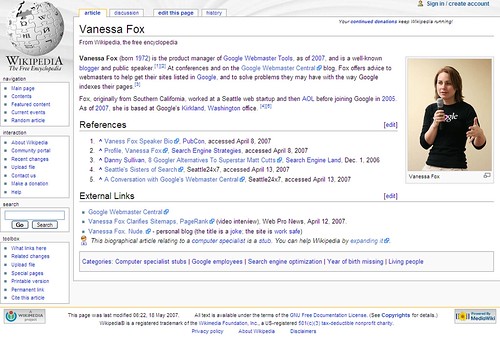
A wiki is a website that can be edited by anybody. The informative content in a wiki is the outcome of the collaborative process made by a community of authors who publish something, edit it and start discussing about it. A wiki is one of the potentialities of Web 2.0 where the user occupies a strategic position and plays an active role in the production of information: while in the traditional Web the user was only a content consumer, in the Web 2.0 the user has turned into a content creator – think about blogs, wiki, social tagging, bookmarking, etc.
The most famous example of a wiki is Wikipedia, the greatest online free content encyclopaedia in the world with more than 10 million articles in 250 different languages. Wikipedia is supported by a web-based wiki software called MediaWiki. I used Wikipedia for my job and in the last two months I created some wiki pages so I’m quite used to it. In my opinion, the most important feature of Wikipedia is that it can be edited and updated by anybody because it uses an easy markup language, based on a number of tags, which is simpler than the markup of HTML. In Wikipedia, both registered users and unregistered ones can edit the articles but only registered users can create a new article. On the contrary, in Pbwiki, which is the software that supports the wiki of our English course, only registered users can edit the pages. In wikipedia, each article is made up of four different pages: “article” is the structural pages where the user can find the information he needs, “edit this page” is the page where you can view and edit the source of the page, “discussion” is the page where the contributors to the page can discuss about editing, deleting and adding of information and “history” is the page where all the changes to the article are recorded in order to trace back step by step the history of the page’s development. The structure of Pbwiki is quite the same but instead of a discussion page, there is a page called “Comments” where the contributors can express their opinion and comments on the content of the page.
All the Wikipedia materials are released under the GNU Free Documentation License (GFDL) which is a copyleft license for open contents that gives to the reader the right to copy, modify and redistribute the work and requires the all copies and derivative works to be available under the same licence. In addition, the original source of the work must be mentioned.
There has been a lot of debate concerning Wikipedia since its birth at the beginning of 2002. One of the crucial issues if the trustworthiness, authoritativeness and authenticity of the information in Wikipedia. Some people think that information in Wikipedia is not reliable because anybody can write whatever he/she wants. This is not completely true. There are rules that are shared by the whole community of Wikipedia: the wikiquette, for instance, asserts the key principle of collaboration in order to improve the articles and respect of the others’ points of view. Articles affected by vandalism, edit wars or offensive behaviour are reviewed and managed by a group of administrators who can protect some pages from editing, overrule some editing and prevent users from creating articles or just editing the existing ones. Talking about this, Luca De Alfaro and a group of researchers of the
Well, the world of Wikipedia is really fascinating, especially because Wikipedia is just the most famous project but the Wikimedia Foundation has launched also other interesting wiki- based projects like Wikisource, Wikinews, Wikiquote or Wikibooks. I’ve been using Wikipedia for only three months but I’m getting quite fond of it. Why don’t you try as well and have a look at it? I’m sure you’ll enjoy it!



Nessun commento:
Posta un commento